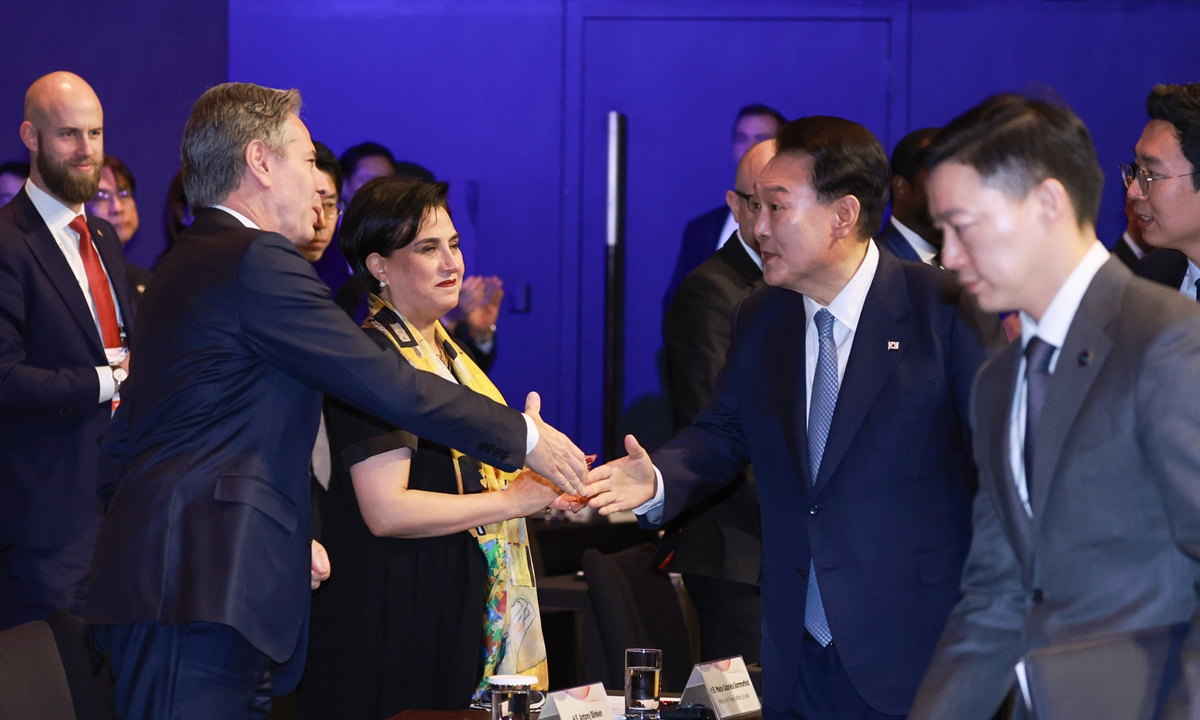
US Secretary of State Antony Blinken meets with South Korean president Yoon Suk-yeol on March 18 in Seoul. Photo: VCG
The third Summit for Democracy conference, an initiative of the US President Joe Biden that has been meeting worldwide critics for increasingly echoing American exceptionalism and double standards since its establishment in 2021, kicked off on Monday in Seoul, capital of South Korea, amid public outcry.
Chinese analysts slammed the so-called Summit for Democracy as an increasingly evident "clown show" which paints a long-have-been bankrupt American portrait in the eye of the world, and moving the event to its key Asian ally South Korea also serves the Biden administration's goal of strengthening the strategic competition against China.
On Monday morning, protesters from various local civic groups in Seoul gathered in front of the Shilla Hotel in downtown Seoul, chanting slogans such as "Oppose the Democracy Summit" and "Democracy Summit spreads false democracy." They also held placards reading "Oppose the US hegemony" and "Oppose the new Cold War confrontation policy," according to chinanews.com.cn.
Philip Kotler, author of Democracy in Decline and a globally recognized marketing guru, told the Global Times that although Biden wants to champion and spread the idea of democracy through the event. This year South Korea is supposed to invite representatives from many democracies to attend and meet South Korean officials. But South Korea seems less interested today in the Summit for Democracy. Even the US is only minimally attending.
Only a delegation led by US Secretary of State Antony Blinken is attending the Seoul-hosting event this year.
Although the summit itself was initiated by Biden, the Biden administration is facing immense domestic pressure in this election year. At this time, choosing to shift the so-called democracy summit, which has already proven to be unpopular and unable to help Biden gain diplomatic points, to South Korea, can be seen as a reluctant move, Lü Xiang, a research fellow from the Chinese Academy of Social Sciences, told the Global Times on Monday.
According to Li Haidong, a professor at the China Foreign Affairs University, outsourcing the event in South Korea, reflecting America's future focus for democratic issues in Asian region, intending to influence and transform the politics and ideological values, and further strengthening the strategic competition against China.
Another purpose of selecting South Korea as the venue is perhaps to reward the Yoon Suk-yeol government, helping to enhance South Korea's international influence, thereby leveraging the extremely pro-American Yoon administration for its own benefit, according to Li.
Under huge pressure from the US to pick sides, South Korea is facing economic downturn and mounting domestic social problems. Taking on the democracy summit is an attempt by the Yoon administration to reverse the plummeting public support, but judging from the protests, the South Korean society knows better and would find such attempt ineffective to address the current problems, Lü pointed out.
This summit is unlikely to make much of a splash, as the democracy summit has only become but a burden for South Korea like a sore spot, Lü said. "Neither the US domestically nor the international community are likely to pay much attention to the so-called summit."
This so-called "democracy summit" is an important platform for the US to showcase its soft power, but in reality, America's soft power globally has long been bankrupt, so this summit is just a "clown show," observers pointed out.
The future of the democracy summit is also a concern. The event is considered as an important achievement for Biden, but after the election, if Trump returns to office, he is not interested in democratic issues and will probably not continue to hold such projects, observers noted.




